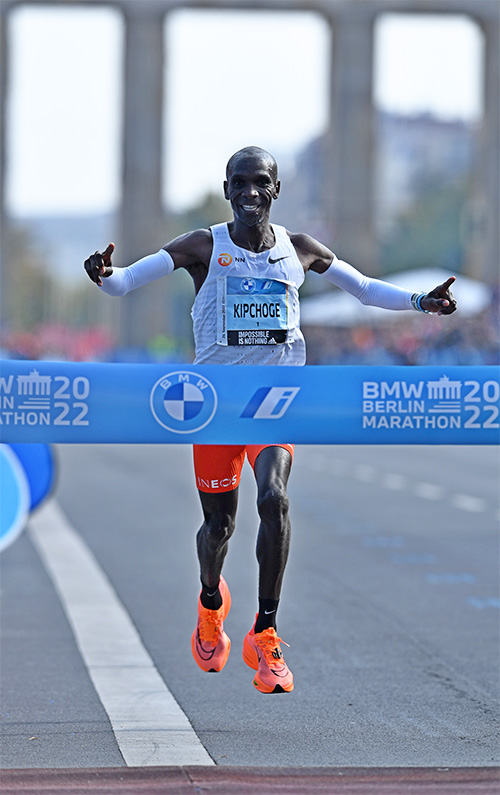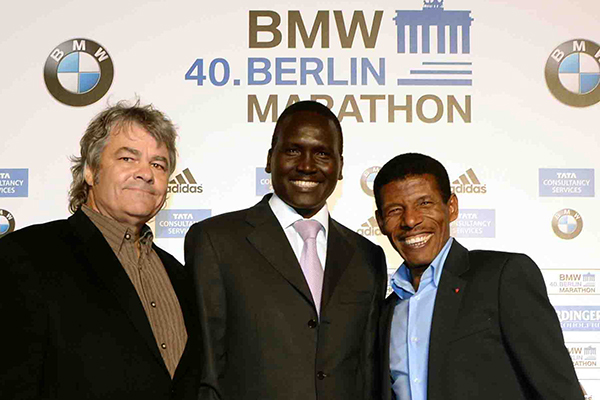
BERLIN, GERMANY, September 25 — Eliud Kipchoge’s ever-brilliant marathon career shines even brighter after the Kenyan marvel pared a half-minute off his ’18 World Record with a demonstrative 2:01:09 effort.
A master of the understatement, the ageless 37-year-old fessed, “I am very happy to achieve a personal best, and if that translates to a course record and a World Record, it is even better.”
Kipchoge returned to the German capital fully intent on making history on the über-fast circuit that is now home to the past eight men’s WRs dating back to Paul Tergat’s 2:04:55 standard in ’03.
In contrast to his ’18 record, where he started at a modest pace then revved up the speed over a 60:34 second half, this time Kipchoge lit out from the start as if on one of his Breaking2 efforts. “Berlin is a place where you can achieve greatness,” he said. “You can push your limits and good things happen.”
He sped well ahead of the expected 60:40 pacing from the opening half, saying “My plan was to run my race and start at a fast pace.” Leading the charge was a trio of rabbits from his training group: Moses Koech, Noah Kipkemboi and Philemon Kiplimo.
With Kipchoge ensconced amidst the pacing formation, the opening tempo was a brisk 2:51 kilometer clip as they crossed the 5K timing mat in 14:14 (2:00:04 pace). Only last year’s winner, Guye Adola, and his fellow Ethiopian Andamlak Belihu had the gumption to stick with the brazen cadence.
The opening 5K is always fast in Berlin before settling into the prescribed pace. Not this year, as to Kipchoge’s beckoning the pace got even hotter with a trio of 2:49 kilometers fueling a subsequent 14:09 segment that sent the runners past the 10K clock in 28:23, a robust 1:59:45 pace.
With Adola and Belihu still clinging to Kipchoge’s heels, the biggest worry for coach Patrick Sang was not the torrid pace but that disaster was just a heel clip away in the tightly bunched lead group of 6: “Eliud can handle the high pace, but I was afraid of contact that may cause a fall.”
The high speed was also a concern of Kipchoge’s manager Valentijn Trouw and race director Mark Milde, who monitored the race via motorbike. “We discussed slowing the pace,” Trouw admitted, but they were in such a steady rhythm that it was best to let them run.”
Kipchoge was much of the same mind, noting, “I thought that my legs were actually running very fast and I thought, ‘Let me try to run 2-hours flat.” So inspired, the pace ramped up even higher as they tapped out 2:49, 2:47 and 2:50 kilometers to reach 13K in 36:49 which projected to a staggering 1:59:29 finish.
That 8:26 burst also sent Adola to the ropes, and a kilometer later the man who battled Kipchoge to the finish in ’16 would let go and do well just to finish in 2:09:43.
Only Belihu remained, with Kipchoge and the pacers as they crossed 15K in 42:33. Sub-1:59:30 pace is exceedingly hard to maintain, such that even with 2:55 and 2:49 kilos the projection had slipped to 1:59:41.
The litany of fast kilometers continued as Kipchoge & Co. tried to stop the slippage — 2:47, 2:51, 2:50, 2:50 and 2:51 netted another 14:09 segment and they crossed 20K in 56:42, driving the pace back down to 1:59:36.
Following a 2:52 K, the lead group made some history reaching halfway in 59:51 — compared to 61:05 in the WR — shocking most observers but bringing satisfaction to Kipchoge.
“When we crossed halfway at 59:51 that was a big motivation,” he asserted. “I was still feeling good, I had no hiccups with the muscles so I could cross this time and I was happy. No one has crossed under 60 in the marathon, never.”
While Kipchoge had broken through a monumental time barrier, the pace had not broken Belihu, who had shadowed the leader’s every move. Far from being annoyed with Belihu’s drafting, Kipchoge admitted, “All I can say is I’ll run my own race, my own pace, and if anybody wants to join my race, I will welcome them. For me, I will stay focused, stay calm, and try to enjoy the running. Try to see the splits, and try to push of course, and then see what happens.”
After making history at halfway, it seemed inevitable that the high pace could not be maintained — even by the pacers. The lead pack quickly thinned out as Koech then Kipkemboi relinquished the pacing reins. As for Belihu, the 23-year-old Ethiopian came in with PRs of 26:53.15 and 58:54 but was heading into uncharted waters in the marathon.
With just three in the lead group the pace began to slip to 2:52/2:55 kilo. After crossing the 25K mat in a record 1:11:08, for the first time the pace went above a 2-hour clip at 2:00:04. The previous low at that checkpoint was a 1:11:18 by Dennis Kimetto in the ’12 race.
Just past 25K, final pacer Kiplimo retired, and a couple of minutes later Belihu gave up the chase. Suddenly, with 17 kilometers (10.6M) of open road ahead of him, Kipchoge was on his own.
This would be a true test for a man who had run most of his previous 18 marathons with a negative split. For the next 13 kilometers he seemed almost human as he struggled to find his rhythm. Low-2:50 splits gave way to high-2:50s. Kipchoge notched his second record of the day crossing the 30K mat in 1:25:40 (compared to his 1:26:45 in ’18) but the pace slipped to 2:00:29.
Kipchoge doubled down his efforts as a slow 2:58 for kilo 31 was followed by 2:52s and 2:53s. But as fatigue shrouded Kipchoge’s usually smiling face, a 2:59 for kilo 36 was followed by a 2:55 and 3:02, and with a 38K split of 1:49:04 the pace had slipped to 2:01:06.
With the prospect of subsequent kilometers slower than 3:00-even, the WR seemed in doubt — except to Kipchoge.
Instead of slipping further, he was able to attack the finishing stretch with 2:54 and 2:55 kilos to reach 40K in 1:54:53. Regaining his form and his smile Kipchoge closed out his effort with a pair of 2:52s.
Running under the historic Brandenburg Gate Kipchoge realized that history was within his grasp and he broke out an even bigger victory smile. Lifting into a sprint he sped home to stop the clock in 2:01:09 and raise his count to 4 of the 5 fastest marathons ever run (see box).
“Today I ran with no limitations and after 38K I knew I would be capable of breaking the World Record,” he said. “Circumstances were great and so was the organization of the event.”
Looking forward he continued, “Let us plan for another day. I will celebrate this record and think about what happens next. In Africa we believe that you chase one record at a time. So, with the record you are chasing as a team, this Berlin Marathon, obtained, we will go back now, sit with the team, sit with the coach and see what is ahead.
“I can say the race was actually good. I always say if you want to be successful, you need great planning and great preparation. The hiccups from here will come, but I am happy. I ran a World Record but it is also a learning process for my future competitions.”
BERLIN MEN’S RESULTS
1. Eliud Kipchoge (Ken) 2:01:09 WR (old WR 2:01:39 Kipchoge ’18)
(14:14, 14:09 [28:23], 14:10 [42:33], 14:12 [56:45], 14:23 [1:11:08 WR — old, 1:11:18 Dennis Kimetto [Ken] ’12], 14:32 [1:25:40 WR — old, 1:26:45 Kipchoge ’18], 14:27 [1:40:07], 14:46 [1:54:53], 6:16) (59:51/61:18);
2. Mark Korir (Ken) 2:05:58; 3. Tadu Abate (Eth) 2:06:28; 4. Andamlak Belihu (Eth) 2:06:40 PR; 5. Abel Kipchumba (Ken) 2:06:49 PR; 6. Limenih Getachew (Eth) 2:07:07; 7. Kenya Sonota (Jpn) 2:07:14 PR; 8. Tatsuya Maruyama (Jpn) 2:07:50 PR; 9. Kento Kikutani (Jpn) 2:07:56; 10. Zablon Chumba (Ken) 2:08:01; 11. Haftom Welday (Eri) 2:09:06 PR; 12. Daisuke Doi (Jpn) 2:09:40; 13. Rintaro Takeda (Jpn) 2:10:18; 14. Yuji Nonaka (Jpn) 2:10:27; 15. Yuki Matsumura (Jpn) 2:10:29; 16. Jie He (Chn) 2:11:18 PR; 17. Atsumi Ashiwa (Jpn) 2:11:39; 18. Ryu Takaku (Jpn) 2:11:41; 19. Gantulga Dambadarjaa (Mgl) 2:12:00; 20. Samuel Russom (Eri) 2:12:16;
… 32. Mike Sayenko (US) 2:15:33;… 34. Brendan Martin (US) 2:16:02;… 39. Jonathan Mott (US) 2:17:20 PR;… 47. Oscar Medina (US) 2:19:16;… rabbits—Moses Koech (Ken), Noah Kipkemboi (Ken), Philemon Kiplimo (Ken).
